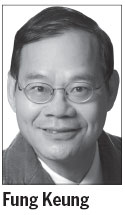Declining English standard hurts HK
Updated: 2012-11-01 05:59
By Victor Fung Keung(HK Edition)
|
|||||||
A study released on Oct 26 by an English educational group, Education First, shows that Hong Kong ranks 25th out of 54 non-English-speaking countries in the world in English language skills, down from 12th two years ago. This is alarming indeed.
Declining English proficiency will hurt Hong Kong's competitiveness in the world economic stage. The city prides itself on being a financial center and a gateway for many foreign companies to enter the mainland market. Such a competitive advantage, I am afraid, is fading rapidly. Soon we will watch business opportunities and big deals flowing to Singapore or Shanghai.
The government, universities and parents must take the lead to sharpen our young people's English language skills. The government can do at least two things. In departmental and Legislative Council meetings, government officials should speak English half of the time. At present, most officials use Cantonese. If officials set an example by using English, I am sure business people will follow suit. Another suggestion is for the government to set aside some funds to establish English book clubs in the city's 18 districts. Incentive schemes such as cash prizes will encourage young people to read in English, which will help cultivate an English reading culture in the city.
In universities, rules must be tightened to ensure that lecturers use English as the teaching medium (except in certain Chinese subjects). Being a lecturer myself, I have witnessed many university professors quietly shift to Cantonese when there are no foreign students in their classes. If university students don't have a sound English-speaking environment, there can be little surprise that many employers find that our graduates can't even write a proper job-application letter.

Parents should try to use English more in communication with their children. Initially it might sound a little bit awkward. But after a while, young people may feel that English is their mother tongue and they will speak it with confidence and ease. I spoke to my daughter in English only until she was four years old. She took an IELTS (international English language testing system) on her graduation year and scored a perfect 9. If I could do it, so can many parents in the city.
I Education First tested 500 young people in each country on their English writing, listening and reading skills. It is heartbreaking to learn that our ranking in the study has dropped to 7th in Asia, down from 2nd two years ago. Hong Kong now is ranked after Singapore, Malaysia, India, Pakistan, South Korea and Japan. We have to face the cruel reality that our young people's English proficiency is lower than that of South Koreans and Japanese, unthinkable, but a fact.
The falling of English standards in Hong Kong can be traced to several factors, although no scientific research has been conducted to prove my surmise. First, the Tung Chee-hwa government, which took office immediately after the British handover of Hong Kong in 1997, adopted a mother-tongue-as-teaching-medium policy in primary and high schools. I am not saying that using the mother tongue is wrong, but it limits young people's chances of using English. We use it or lose it, as an old saying goes.
Another factor can be attributed to the so-called "mainlandization" of Hong Kong. In recent years, liberal policies have allowed thousands of mainland tourists to visit Hong Kong. Many shops and property agents have hired staff who can speak Putonghua, but not English. As a result, many local office workers are polishing up their Putonghua skills, not English. A proficiency in Putonghua also will help them find jobs on the mainland, which are aplenty.
Knowing what is wrong is one thing. Having the courage to make amendments is another. I wholeheartedly wish that government officials, educators and parents will form a "united front" to tackle this seemingly crucial language issue.
The author, who has published seven books on English enhancement, is coordinator of the B.S.Sc in financial journalism program at Hong Kong Baptist University.
(HK Edition 11/01/2012 page3)